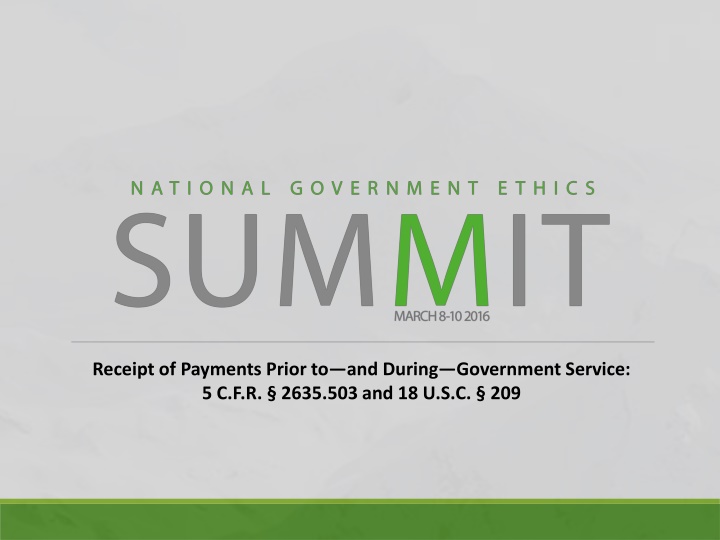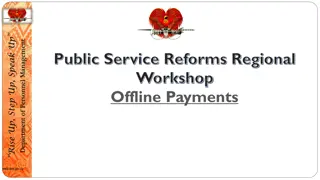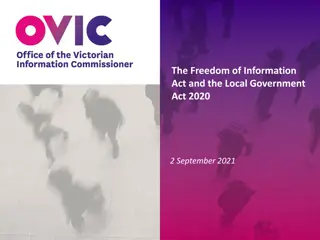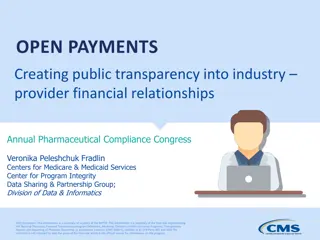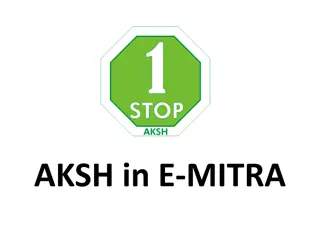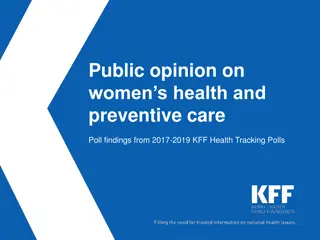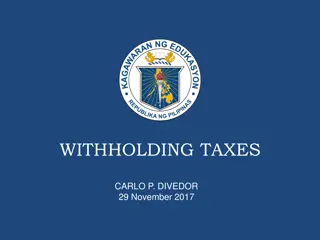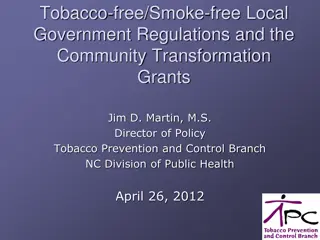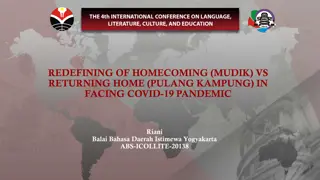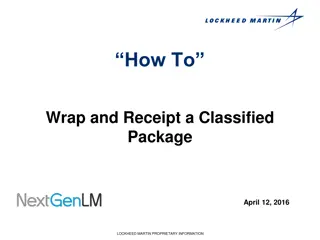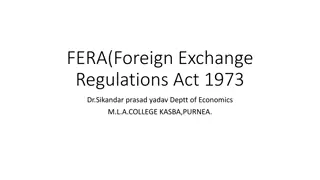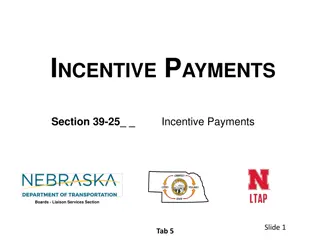Regulations Prohibiting Receipt of Payments in Government Service
Regulations such as 18 U.S.C. 209 aim to prevent government employees from receiving payments outside of their official salary to avoid conflicts of interest, favoritism, and suspicions among colleagues. The law prohibits any supplementation of salary from sources other than the U.S. government for employees of the executive branch.
Download Presentation

Please find below an Image/Link to download the presentation.
The content on the website is provided AS IS for your information and personal use only. It may not be sold, licensed, or shared on other websites without obtaining consent from the author.If you encounter any issues during the download, it is possible that the publisher has removed the file from their server.
You are allowed to download the files provided on this website for personal or commercial use, subject to the condition that they are used lawfully. All files are the property of their respective owners.
The content on the website is provided AS IS for your information and personal use only. It may not be sold, licensed, or shared on other websites without obtaining consent from the author.
E N D
Presentation Transcript
Receipt of Payments Prior toand DuringGovernment Service: 5 C.F.R. 2635.503 and 18 U.S.C. 209
18 U.S.C. 209 Supplementation of Salary
Purposes Divided Appropriations loyalty
Three basic concerns underlie this rule prohibiting two payrolls and two paymasters for the same employee on the same job. First, the outside payor has a hold on the employee deriving from his ability to cut off one of the employee s economic lifelines. Second, the employee may tend to favor his outside payor even though no direct pressure is put on him to do so. And, third, because of these real risks, the arrangement has a generally unwholesome appearance that breeds suspicion and bitterness among fellow employees and other observers. Ass n of the Bar of the City of N.Y., Conflict of Interest and Federal Service 211 (1960)
Legislative History 1917 1948 1962 18 U.S.C. 209 18 U.S.C. 1914 5 U.S.C. 66 Replaces 1914 as part of Title 18 reorganization and passage of our current criminal conflicts of interest laws at 18 U.S.C. 201 209. Criminal code consolidated and revised in Title 18, with minor amendments made to the statute Prohibits Government official or employee from receiving any salary in connection with his services as such an official or employee from any source other than the Government of the United States In connection with as compensation for
Prohibition Whoever receives any salary, or any contribution to or supplementation of salary, as compensation for his services as an officer or employee of the executive branch of the United States Government . . . from any source other than the Government of the United States . . . ; or Payee Whoever, whether an individual, partnership, association, corporation, or other organization pays, makes any contribution to, or in any way supplements the salary of any such officer or employee under circumstances which would make its receipt a violation of this subsection Payor Shall be subject to the penalties set forth in section 216 of this title. 18 U.S.C. 209(a)
Elements: 18 U.S.C. 209 prohibits: (1) An officer or employee of the executive branch, (2) from any source other than the United States, (3) from receiving salary or any contribution to or supplementation of salary (4) as compensation for services as an employee of the United States.
(1) An officer or employee of the executive branch Must be an employee at the time the payment is made Crandon v. United States, 494 U.S. 152 (1990) See OGE Informal Advisory Opinion 91 x 2 Includes Government-owned corporations United States v. Morse, 292 F. 273 (S.D.N.Y. 1922) What about appointees who have not begun service? 26 Op. O.L.C. 32 (2002) Conflicts of interest rules apply when the appointee begins the duties of his or her office, which is the same determination as the time when the official begins to accrue his or her salary. Based on the definitions of officer and employee in Title 5 of the United States Code. OGE Informal Advisory Opinion 02 x 3
(2) From any source other than the United States Source = any person or organization for-profit and non-profit organizations trade associations corporations Compensation paid to an employee by the U.S. Government does not violate 209 even if the funds can be traced back to a private entity Ex. Federal Technology Transfer Act (15 U.S.C. 3701-3717) Government agencies are required to pay an employee/inventor a certain percentage of royalties that the agency receives from any licensing agreement for an invention. Because these payments are paid to the employee by the Government, there is no violation of 209, even if the funds originated from others. 17 Op. O.L.C. 46 (1993)
(3) From receiving salary or any contribution to or supplementation of salary Anything of monetary value Cash or in-kind payments Coverage extends to lump sum and periodic payments United States v. Project on Gov t Oversight, 616 F.3d 544 (D.C. Cir. 2010)
(4) As compensation for services as an employee of the United States INTENT OF THE PARTIES United States v. Project on Gov t Oversight, 616 F.3d 544 (D.C. Cir. 2010) Need a direct linkage between the thing of value paid and the official services rendered by the employee OGE Informal Advisory Opinion 81 x 31 24 Op. O.L.C. 170 (2000)
Determining Intent Nature of the services Are the services the same or similar to the duties and responsibilities that the employee provides to the Government? United States v. Martinez, 76 F.3d 1145 (10th Cir. 1996) OGE Informal Advisory Opinion 86 x 8 2 Op. O.L.C. 361 (1977) Are they distinct? United States v. Muntain, 610 F.2d 964 (D.C. Cir. 1979) OGE Informal Advisory Opinion 83 x 4 Consider outside earned income limitations (5 U.S.C. app. 501(a)) Is the compensation for past services from a previous employer? OGE Informal Advisory Opinion 87 x 11
21 Op. O.L.C. 204 (1997); OGE Informal Advisory Opinion 02 x 4 Determining Intent Relevant factors to consider: Whether the expressed intent of the payor is to compensate for government service United States v. Oberhardt, 887 F.2d 790 (7th Cir. 1989) Whether the employee is in a position to influence the Government on behalf of the payor United States v. Kim Oahn Thathitran (aka Jennifer Kim Tran) (2010 OGE Prosecution Survey: LA-11-08) Whether the compensation is given to the employee because of his official position United States v. Patricia Raikes (2005 OGE Prosecution Survey: DO-06-022) Whether there is a substantial relationship or pattern of dealings between the employee s agency and the payor E.g., contracting officer/contractor situations
21 Op. O.L.C. 204 (1997); OGE Informal Advisory Opinion 02 x 4 Determining Intent Relevant factors to consider: Whether the payor is another Government employee Whether circumstances indicate that payment is motivated by a desire other than to compensate the employee for Government service E.g., medical needs; sympathy and respect; a familial relationship Whether similar payments would also be made to non-Government employees E.g., receipt of severance payments; vesting of stock options; payment of a partnership share Bona fide public service awards 8 Op. O.L.C. 143 (1984)
Key Concerns 1. Payment 2. To a government employee 3. From someone who has business before the employee s agency and 4. The payment was not made as part of some established policy
Exceptions (a) Payments from state or local governments (b) Employee pension or benefit plans (c) Special Government Employees (SGEs) or uncompensated employees (d) Contributions under the Government Employees Training Act (5 U.S.C. 4111) (e) Executive exchange or fellowship programs (f) Persons injured during the commission of certain offenses (g) Private sector employees assigned to an agency as part of the IT Exchange Program (5 U.S.C. 3701, et seq.) (h) Pay to members of the reserve components of the armed forces called to active duty that would have been paid in absence of call to active duty
How is Salary Supplementation different than Bribery or Illegal Gratuities? No payment or receipt of salary or contributions to the salary of a federal employee from a non-governmental source as compensation for services as a federal employee. 18 U.S.C. 209(a) Salary Supplementation Illegal Payments that are not necessarily corrupt, but constitute offers or acceptances of things of value for or because of official acts or testimony. 18 U.S.C. 201(c). Gratuities Bribes Corrupt offer or acceptance of a thing of value with intent to influence official acts, to induce acts or omissions, or to influence witnesses. 18 U.S.C. 201(b)
Guidance DO-02-016 / Informal Advisory Opinion 02 x 4 remain OGE s most thorough guidance on this statute Other OGE Legal Advisories Department of Justice OLC opinions Judicial opinions OGE Desk Officers
5 C.F.R. 2635.503 Extraordinary Payments
Purpose Three basic concerns underlie this rule prohibiting two payrolls and two paymasters for the same employee on the same job. First, the outside payor has a hold on the employee deriving from his ability to cut off one of the employee s economic lifelines. Second, the employee may tend to favor his outside payor even though no direct pressure is put on him to do so. And, third, because of these real risks, the arrangement has a generally unwholesome appearance that breeds suspicion and bitterness among fellow employees and other observers. Ass n of the Bar of the City of N.Y., Conflict of Interest and Federal Service 211 (1960)
Regulatory History An extraordinary payment from a former employer received prior to beginning Federal service raises a legitimate concern, and thus an appearance, that the employee may not act impartially in particular matters to which the former employer is a party or represents a party. The disqualification requirement that would be imposed by 2635.503 is intended to address those appearance issues. 56 FR 33778
Elements: Who is covered by 2635.503? Any individual who, prior to entering government, 1. Receives any item or thing of value worth more than $10,000; 2. That is being provided on the basis of a determination made after it became known to a former employer that the individual was being considered for or had accepted a Government position; and 3. Other than pursuant to the former employer s established compensation, partnership, or benefits programs.
Elements Cont: Established Program 3. Other than pursuant to the former employer s established compensation, partnership, or benefits programs Established means The program is in writing; or There is a history of similar payments made to others not entering government.
Prohibition: What is the Coverage? An employee covered by 2635.503 shall not: Participate in a particular matter in which the former employer is a party or represents a party; and The disqualification runs for two years from the date the payment is received by the employee.
Exception Agency Determination The requirement to recuse may be waived if: The head of an agency makes a finding In writing That the amount of the payment was not so substantial as to cause a reasonable person to question the employee s ability to act impartially
Time for Some Hypotheticals Hypo 1: Covered by .503? Why? Should you advise the employee to reject the payment? Why? Do you think this is a 209 violation? Why?
Elements: Who is covered by 2635.503? Any individual who, prior to entering government, 1. Receives any item or thing of value worth more than $10,000; 2. That is being provided on the basis of a determination made after it became known to a former employer that the individual was being considered for or had accepted a Government position; and 3. Other than pursuant to the former employer s established compensation, partnership, or benefits programs.
21 Op. O.L.C. 204 (1997); OGE Informal Advisory Opinion 02 x 4 Determining Intent Relevant factors to consider: Whether the expressed intent of the payor is to compensate for government service Whether the employee is in a position to influence the Government on behalf of the payor Whether there is a substantial relationship or pattern of dealings between the employee s agency and the payor Whether the compensation is given to the employee because of his official position Whether the payor is another Government employee Whether circumstances indicate that payment is motivated by a desire other than to compensate the employee for Government service E.g., medical needs; sympathy and respect; a familial relationship Whether similar payments would also be made to non-Government employees Bona fide public service awards
Time for Some Hypotheticals Hypo 2: Covered by .503? Why? Should you advise the employee to reject the payment? Why? Do you think this is a 209 violation? Why?
Time for Some Hypotheticals Hypo 3: Should you advise the employee to reject the payment? Why? Do you think this is a 209 violation? Why?
Time for Some Hypotheticals Hypo 4, Situation 1: Should you advise the employee to reject the payment? Why? Do you think this is a 209 violation? Why?
Time for Some Hypotheticals Hypo 4, Situation 2: Should you advise the employee to reject the payment? Why? Do you think this is a 209 violation? Why?
Leigh Francis Assistant Counsel Ljfranci@oge.gov 202-482-9313 Patrick Lightfoot Assistant Counsel Pjlightf@oge.gov 202-482-9271
